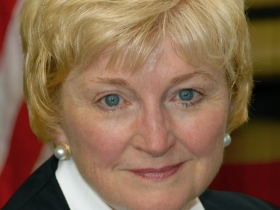More Power for Pat?
Roggensack’s reelection solidifies her power and that of the conservative bloc she often leads.

Justice Patience Roggensack
The Wisconsin Supreme Court is a veritable fortress for incumbents. In its 161 history, through more than 120 elections, just two justices seeking reelection have been defeated. One was Samuel Crawford in 1855, thrown out for writing a controversial opinion saying the state must enforce the Fugitive Slave Act. The other loser was Chief Justice George Currie in 1967, who had joined an opinion saying it was legal for the Milwaukee Braves to move to Atlanta. Sports fans didn’t forgive that one. (Another four justices in state history, including Louis Butler in 2008, were appointed to the court and lost their bid for election.)
So the chances that challenger Ed Fallone would defeat incumbent Pat Roggensack, first elected in 2003, were slim indeed. Perhaps that’s why Roggensack’s campaign manager Brandon Scholz, a veteran of many notable GOP campaigns, was so confident, jubilantly predicting Fallone couldn’t win.
“My guess is that when Fallone got in the race he thought he would get a lot of national money,” Scholz observed in an interview three weeks before the election. But the reality is that Wisconsin has a bad track record for liberals in recent high court races, with conservative groups outspending their counterparts. And that was before Act 10 destroyed public unions in Wisconsin, leaving WEAC and AFSCME with depleted treasuries, in no position to spend as much as conservative groups like the Wisconsin Manufacturers and Commerce.
“I’ve been on a daily watch to see if WEAC or AFSCME would engage in third party spending,” Scholz told me. “That hasn’t happened.”
As a result, conservative groups didn’t even have to spend that much on Roggensack. The ironic result was a low-spending campaign. Roggensack simply played the incumbent’s game, noting her many endorsements from judges, sheriffs, district attorneys and law enforcement unions, stressing her bench experience, and giving the media little access. She was too busy, I was told, to grant me more than a 10 minute interview, and she simply blew off the Shepherd Express.
The result is a victory for the four-person conservative bloc — led by Roggensack — that controls that court. And when liberal justice Ann Walsh Bradley runs for reelection in 2015, she may face a conservative challenger with far more money than she can raise, given the demise of public unions in Wisconsin.
The fact that a little-known challenger was able to get 43 percent of the vote with a campaign that started late and lacked money may bespeak an electorate which polls show has an awareness of the court’s troubles. Many might have felt there was merit to Fallone’s claim that the court has become dysfunctional.
Roggensack says she will work hard to overcome the court’s divisions, but she failed at that in the past and offered no new solutions during the campaign. She led the way in refusing to refer the case involving Justice David Prosser’s physical encounter with Bradley to state appeals court judges, as prosecutor Frank Gimbel had proposed, and as such cases are commonly handled. So there will never be a hearing of the evidence against Prosser.
And Roggensack was all over the map as to whether judges should recuse themselves in cases involving campaign donors. She told me a $1,000 donation was too low to require a recusal and she might consider doing so if a donation was as high as $10,000, but by late in the campaign she dropped that to $1,000. The reality is, as a result of the ruling she wrote — and the conservative bloc supported — no donation by itself can require a recusal, so judges can ignore the issue should they so choose.
Roggensack also wrote another rule that has closed all administrative hearings of the high court, leaving no way for the media and the public to objectively judge how the court’s members relate to each other and govern fellow justices.
All of which suggests the court will continue to have internal squabbles that hurt its prestige. Not long after the Prosser-Bradley affair, Hofstra Law School professor James Sample, who has written and been quoted frequently about state supreme courts, offered a glum assessment. For decades, Wisconsin had a reputation as one of the “premier” state Supreme Courts, he told the Milwaukee Journal Sentinel, adding that “Wisconsin’s court has gone from being this national model to a national punch line.”
If Roggensack is serious about trying to restore the court’s reputation, she certainly has her work cut out for her.
This column originally ran in the Madison weekly Isthmus.
Murphy's Law
-
The Last Paycheck of Don Smiley
 Dec 17th, 2025 by Bruce Murphy
Dec 17th, 2025 by Bruce Murphy
-
Top Health Care Exec Paid $25.7 Million
 Dec 16th, 2025 by Bruce Murphy
Dec 16th, 2025 by Bruce Murphy
-
Milwaukee Mayor’s Power in Decline?
 Dec 10th, 2025 by Bruce Murphy
Dec 10th, 2025 by Bruce Murphy






















The piece started quite logically but death-spiraled in a full wail of self-pity.
Incumbents are inherently difficult to beat from either side. Wisconsin chooses to elect a high court, and by that decision will trigger perceived conflicts because of campaign donations. These are facts, not some Great Right conspiracy.
You didn’t get what you wanted. You’ll live.
Bruce, we get it, you do not like Roggensack. So she only had 10 minutes for you and none for the glorified weekly shopper that is the Shepherd Express. So what? You consistently attack Conservatives and have made no efforts to hide your bias. She wisely knew that anything said to you would be used only in such a way as to further your personal political agenda. It appears as though she also makes wise decisions while not on the bench, good for her. You have gone after Ryan, Walker and Roggensack recently. I am guessing your next hatchet piece will not be on a Progressive. Just a hunch.
I must read a completely different version of Urban Milwaukee than the above two commenters…
Danimal, you seem to be struggling with comprehension issues. Read Murphy’s articles slower or have someone read it aloud for you. Or were you attempting to make some kind of point?
Wisconsin is long overdue for an appointed Supreme Court.